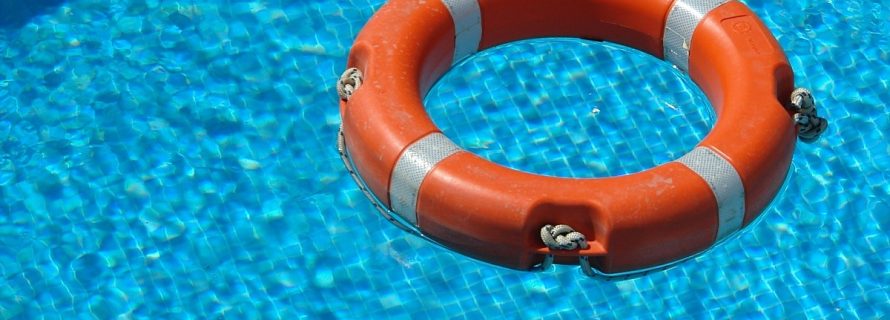Pool safety 101: Keep cool and safe

When the summer sun is beating down, nothing may be more refreshing than a nice dip in the pool. Although many Long Island residents live just down the street from the ocean, residential pools are different. You don’t have to worry about hot sand, cold water, crowded parking lots or the other aspects that can make beaches less than relaxing. Pools can be fun places for adults, kids and families to cool off, exercise and play. However, in addition to the benefits of these aquatic home additions, they can also present dangers to the people who use or own them. We interviewed Kyle Chaikin, President of North East Spa and Pool Association and owner of Chaikin Ultimate Pools, and he shared a few of the basic safety tips that any pool owner or user should know.
Keep a safety kit ready
Just as in many emergency situations, once something goes wrong in the pool, it’s important to act fast. The U.S. Consumer Product Safety Commission operates an excellent pool safety resource, PoolSafely.gov. One of the site’s many pieces of advice is for homeowners to keep a safety kit near their home pool or spa. This kit includes a telephone capable of calling 911, a flotation device, a first-aid kit and a pair of sharp scissors to cut clothing, hair or pool covers. All of these items can come in useful for an emergency situation where someone is caught or drowning in the pool.
“We also have national, regional and local professional organizations that can be turned to for information. The Association of Pool & Spa Professionals and The Northeast Spa & Pool Association as well as The Long Island Pool & Spa Association are great sites, all of which have links to pool safety,” Chaikin stated.
Have your pool’s filtration system inspected
There are laws in place, such as the federal Virginia Graeme Baker Pool and Spa Safety Act, that regulate the suction and safety of internal pool features. This law specifically deals with suction that can trap young children underwater. Have your suction and filtration system checked to ensure that there are safeguards in place to reduce the suction and keep your system working well without danger. Using a licensed professional to build and service your swimming pool can make sure it is as safe as possible and that all building codes are being followed.
Build reliable barriers
Many of the worst pool-related injuries and deaths are due to accidental falls by young children. Building fences or barriers around pools can help prevent these accidents. The American Red Cross recommended that people have fences or barriers that are at least 4 feet tall all around the pool. Gates should latch automatically to prevent them from being accidently left open. Also, doors and windows opening from the house to the pool should be childproof. In many areas, laws govern the safety rules around a pool, but extra precaution is also important.
Adults aren’t immune to pool dangers either. The most important aspects of pool safety include constructing proper infrastructure to limit the likelihood of accidents. According to Chaikin, safety is multifaceted and not just “one of the above choices.” It should be “layered.” Having an alarm on the doors and windows leading to the yard, the fence around the pool and an alarm in the pool are precautions you should take. Most of all, adult supervision whenever kids are around the pool is very important as well.
A fun summer is important; however being safe should be a top priority.
- Additions and New Construction
- All Exteriors
- Alterations
- Basements
- Bathrooms
- Customer Service
- Customer Stories
- Decks
- Design & Planning Show
- DIY
- Doors
- Educational Resources
- Extreme Makeover Home Edition
- Fashion Show
- General Remodeling
- Green Living
- Handyman Home Services
- Home Decor
- Home Entertainment
- Home Improvement
- Home Improvements
- How to Tips
- In The Community
- Kitchens
- Off-the-Wall Remodeling Stories
- Remodeling
- Resources
- Roofing
- Siding
- Social Media
- Sunrooms
- Tips & Tricks
- Trends
- Windows

